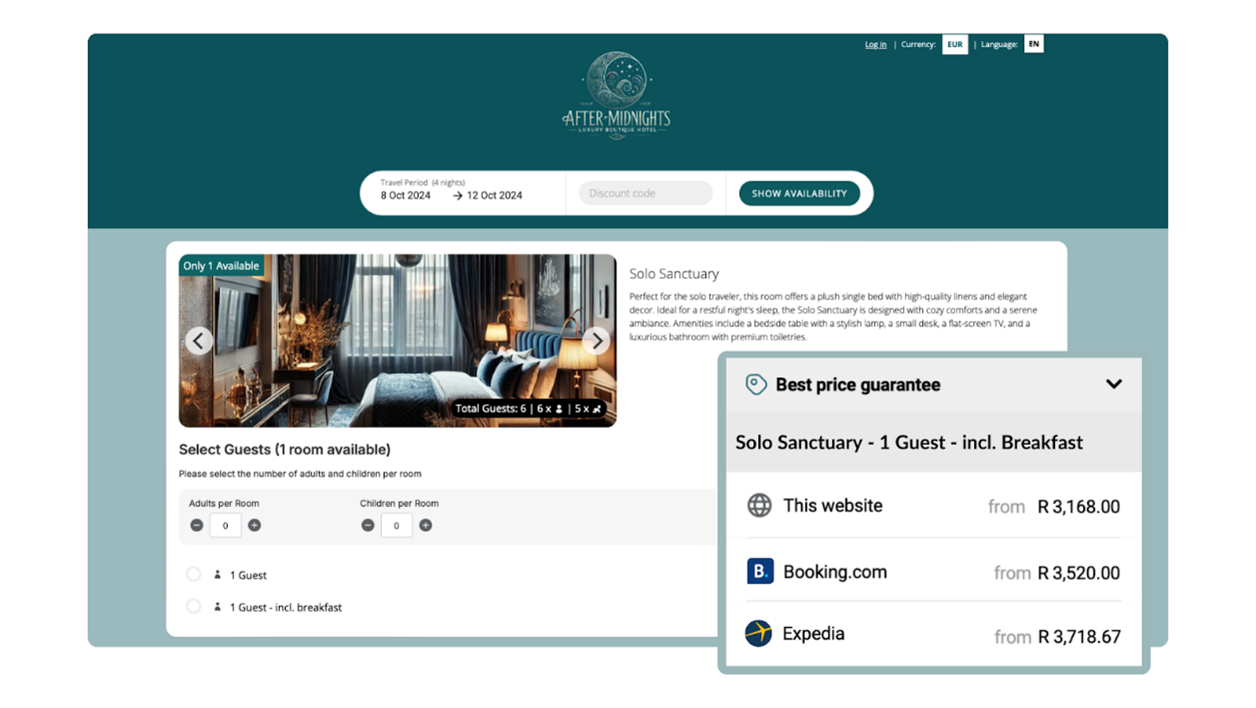Booking.com's recent decision to lift its wide and narrow price parity rules is a game changer for independent hotels in South Africa.
For many small accommodations lacking dedicated teams to handle tasks like advertising, reservations and the digital guest journey, relying on online travel agencies (OTAs) has been a convenient solution. According to RoomRaccoon’s South African Summer Hospitality Report 2024, OTAs like Booking.com drove 42% of all bookings in the past summer season. However, this convenience often comes at a steep price as commission fees can significantly eat profit!
While OTA giants like Booking.com remain essential for boosting visibility and attracting global travellers, removal of the rules allows hoteliers to set competitive pricing against OTAs.
Here’s how hotels can capitalise on their newfound freedom and increase direct revenue:
-
Enhanced online presence can increase commission-free direct bookings
It’s important that hotels can provide the same level of booking experience as an OTA. According to Skift, only 64% of hotels globally have a booking engine, leaving 36% unable to capture direct reservations online.Hotels wanting to decrease dependence on OTAs and increase revenue need the right tools. An optimised website and integrated commission-free booking engine with high-quality images and well-managed descriptions can greatly increase a property's attractiveness. However, offering real-time availability, secure payment processing and instant confirmations can be a game changer in converting lookers into bookers.
Hotels can also leverage an array of tools, such as Price Checker widgets, which compare direct booking and OTA rates and offer direct booking discount codes to increase conversion.

-
Access to guest data can improve return on marketing investment
When guests book directly, hotels acquire valuable data before their stay. This enhances the guest experience with tailored touches and affords hotels the perfect opportunity to fine-tune their marketing efforts by focusing resources on profitable segments.The rate parity ban allows hotels to leverage advertising on metasearch engines, such as Google Hotels, effectively – and compete head-to-head against OTAs with visibility to attract direct booking rates. They typically operate on a cost-effective pay-per-stay model unlike standard search ad campaigns, which charge pay-per-click rates.
Through strategic bidding, hotels can boost their visibility and secure higher rankings, giving them a stronger competitive edge against OTAs. RoomRaccoon manages Google Hotel Ads bidding strategies to maximise returns for hoteliers at no additional cost.
-
Dynamic pricing strategies can outpace OTAs' undercutting tactics
OTAs constantly adjust prices to remain competitive and attract more bookings. Prior to the policy change, OTAs could even offer lower prices than those on the hotel’s website, cutting into their own commission to secure last-minute bookings.To truly capitalise on the freedom granted by Booking.com's new policy, hotels can implement similar dynamic pricing tools to ensure their direct rates are competitive without undercutting their own profitability. By offering competitive and attractive rates, hotels can encourage more direct bookings on their own websites, reducing their reliance on OTAs and the associated commission fees.



















